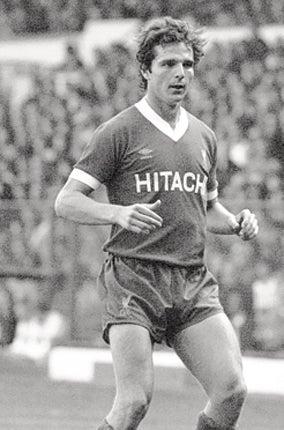Avi Cohen: Footballer who played a significant cameo role in Liverpool's 1980 League title victory

Your support helps us to tell the story
From reproductive rights to climate change to Big Tech, The Independent is on the ground when the story is developing. Whether it's investigating the financials of Elon Musk's pro-Trump PAC or producing our latest documentary, 'The A Word', which shines a light on the American women fighting for reproductive rights, we know how important it is to parse out the facts from the messaging.
At such a critical moment in US history, we need reporters on the ground. Your donation allows us to keep sending journalists to speak to both sides of the story.
The Independent is trusted by Americans across the entire political spectrum. And unlike many other quality news outlets, we choose not to lock Americans out of our reporting and analysis with paywalls. We believe quality journalism should be available to everyone, paid for by those who can afford it.
Your support makes all the difference.The pundit who described Avi Cohen as "the Beckenbauer of the Middle East" might have been a trifle fanciful in his assessment, but Liverpool fans of a certain age will appreciate the image thus conjured of the poised, smoothly stylish Israeli international defender who played a small but telling part in the Merseysiders' League championship triumph of 1979-80.
In only his second outing for the club, Cohen, the first player from his country to feature in the English top division, scored for both sides as the Reds secured the title by beating Aston Villa at Anfield. After conceding an unlucky own goal to gift the visitors an equaliser, Cohen wished the ground would swallow him up, but soon he sent the Kop into paroxysms of glee by scoring to put Liverpool on the way to a comfortable and decisive victory.
Inevitably, the tall, exotic newcomer – performers from overseas were still comparatively rare birds in the English game at the time – was clasped to the fans' collective bosom and, given his appealing cocktail of easy elegance on the ball, shrewd anticipation of the unfolding action and abundant physical courage, it seemed that a lasting new folk hero was born.
However, Cohen lost his battle for the left-back berth with the enduringly admirable and distinctly more pacy Alan Kennedy, and after making a minor contribution to Liverpool's progress to the 1981 European Cup final – in which the Reds prevailed thanks to Kennedy's brilliant late strike – the Israeli returned to his homeland, where he spent the prime years of his career.
Cohen, who was versatile enough to fill any defensive or midfield position, had first risen to prominence with Maccabi Tel Aviv, making his entrance in 1975 and earning the first of his half-century of international caps a year later. He was a star performer as the club became Israeli champions in 1976-77 and 1978-79, his class and assurance attracting the attention of the Liverpool manager Bob Paisley, who took him to Anfield in a £200,000 deal in the summer of 1979.
That September Cohen made his senior debut for the Reds, rising from the bench to replace the injured midfielder Ray Kennedy at Leeds, but he seemed off the pace and out of his depth and it was not until six months of rigorous training had prepared him for the frenetic rigours of the English game that Cohen re-entered the fray in such memorable fashion against Villa.
An affable and intelligent fellow, he became popular with fellow footballers and supporters alike, not least because of his strenuous and successful efforts to learn the language. One story about Cohen's linguistic enterprise has entered Anfield folklore. When he found himself changing at the next dressing-room peg to Kenny Dalglish, the newcomer declared repeatedly to his Scottish team-mate: "You and me – the same!" In his customary broad Glaswegian, Dalglish asked the Israeli what he meant, and Cohen reiterated: "You and me – the same. We both [need to] learn English!" When he left Liverpool in November 1981, having made 23 appearances for the Merseysiders and collected two FA Charity Shield winner's medals, he went back to Maccabi in a £100,000 deal.
Thereafter he flourished in Tel Aviv for six years before making a fleeting return to Britain, being recruited to Rangers by Graeme Souness, a former Anfield colleague who had become player-manager at Ibrox. By then into his 30s, Cohen was hampered by injuries and made scant impact in Glasgow, enjoying only a handful of senior outings. However, one of them earned him a major honour, a League Cup winner's medal for his substitute appearance in October 1987 in the 3-3 Hampden Park draw with Aberdeen, the game being settled by a penalty shoot-out.
In 1988, the year in which the one-time international captain was awarded his 51st and final full cap, Cohen went back to Israel, where he spent two seasons assisting Maccabi Netanya before retiring as a player in 1990. Later he coached extensively, worked as a television and radio pundit and for the last eight years had been chairman of the Israeli Professional Footballers' Association.
Cohen, whose son Tamir plays for Bolton Wanderers and Israel, sustained head injuries in a motorcycle accident on 20 December and died nine days later in a Tel Aviv hospital.
Ivan Ponting
Avraham Cohen, footballer: born Cairo 14 November 1956; played for Maccabi Tel Aviv 1975-79 and 1981-87, Liverpool 1979-81, Rangers 1987-88, Maccabi Netanya 1988-90; capped 51 times by Israel 1976-88; married (three children); died Tel Aviv 29 December 2010.
Join our commenting forum
Join thought-provoking conversations, follow other Independent readers and see their replies
Comments